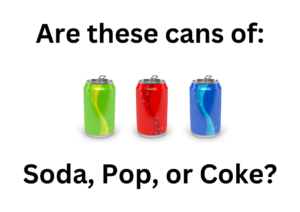While I am not a Grammar Nazi, I would say that I’m a Use Your Words Properly Nazi.
A what?
I tend to get snarky when people use the wrong words. Or sassy. For example, I was at a workout and the trainer had us swinging our knees side to side. The goal is to become limber enough that your knee can make it to the opposite ankle. In all of that, the trainer said, “ankle to knee.” So, being the smart aleck that I am, I started lifting my feet and touching my ankles to the opposite knees. Although this is probably also a good mobility movement, it was not what the trainer wanted.
There is a difference between taking your knee to your ankle and taking your ankle to your knee.
Yes, this is a small and petty example.
Here’s another: I had a writing assignment in high school to create instructions for making a peanut butter and jam sandwich. The catch was that the “person” following the instructions was from another planet and only knew the meanings of words. We then tried the instructions out on each other. The alien’s job was to make as big a mess as possible while still following the written directions provided. Points like how to open the jar or what part of the knife to pick up became really important!
People Are Easily Confused
Even if you live in a uni-culture, uni-language community, only speak to others face to face, and never use slang, it is still possible to cause confusion.
 When dealing with multiple cultures and/or languages, as well as different communities, the opportunity for confusion explodes. In the United States, there are three common terms for a carbonated beverage: soda, pop, and coke. Yes, there are places where a root beer is called a coke. In the U.S. we speak of pants; however, in England, they say trousers – “pants” are underwear.
When dealing with multiple cultures and/or languages, as well as different communities, the opportunity for confusion explodes. In the United States, there are three common terms for a carbonated beverage: soda, pop, and coke. Yes, there are places where a root beer is called a coke. In the U.S. we speak of pants; however, in England, they say trousers – “pants” are underwear.
Imagine how many times I left a conversation feeling somewhat befuddled when I worked in the San Francisco office of an Australian company that employed “English” speakers from around the world.
Use Your Words Properly
Confusion happens. How to reduce it requires using your words with thought.
- Know the meanings of the words you use.
- Move things in the proper direction.
- Group things consistently. (Is it a set of tasks, or a set of stations with multiple tasks at each station?)
- Use the proper names of things – at least as you know them.
- Be cautious of slang.
I think I was at least 10 before I knew that a rubber spatula was, in fact, a rubber spatula and not a jipper or that a wire whisk wasn’t a wingding. Family slang can be the worst for the kids who grow up with it and don’t know it’s slang. - If you have a language specific to your profession or group, make sure the newbies know the new meanings of your words.
All of this means that industry lingo outside of your industry is not a good idea. Also, all those buzzwords people tend to love are quite rude – but that’s a different rant, that I’ve already ranted.
– Lorrie Nicoles
